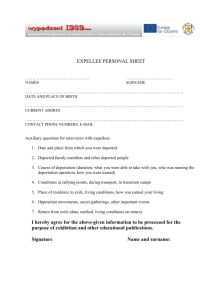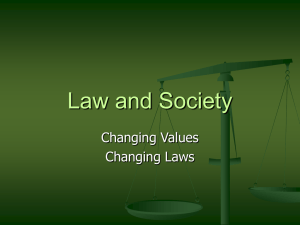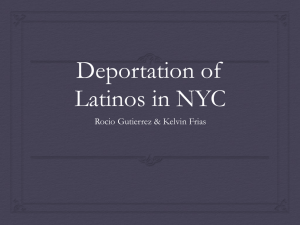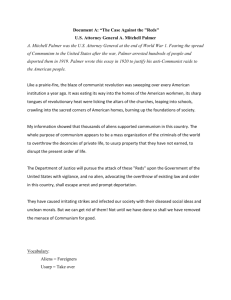Document 11102927
advertisement
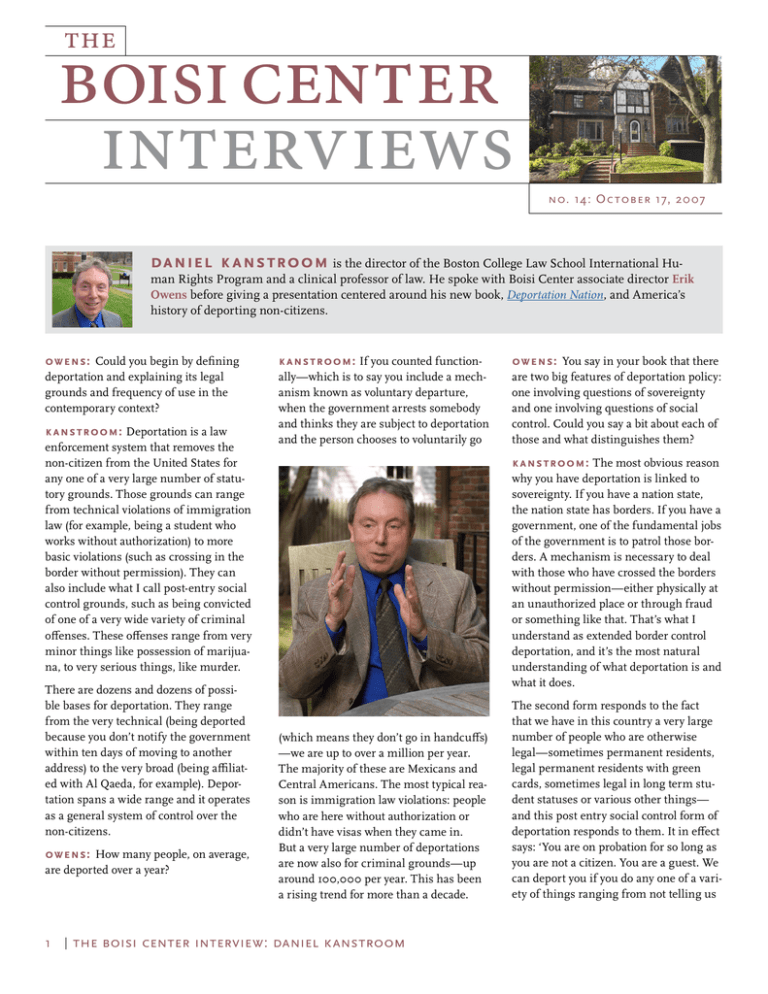
the boisi center interviews no. 14: Oc tober 17, 20 07 daniel kanstroom is the director of the Boston College Law School International Hu- man Rights Program and a clinical professor of law. He spoke with Boisi Center associate director Erik Owens before giving a presentation centered around his new book, Deportation Nation, and America’s history of deporting non-citizens. owens: Could you begin by defining deportation and explaining its legal grounds and frequency of use in the contemporary context? kanstroom: Deportation is a law enforcement system that removes the non-citizen from the United States for any one of a very large number of statutory grounds. Those grounds can range from technical violations of immigration law (for example, being a student who works without authorization) to more basic violations (such as crossing in the border without permission). They can also include what I call post-entry social control grounds, such as being convicted of one of a very wide variety of criminal offenses. These offenses range from very minor things like possession of marijuana, to very serious things, like murder. There are dozens and dozens of possible bases for deportation. They range from the very technical (being deported because you don’t notify the government within ten days of moving to another address) to the very broad (being affiliated with Al Qaeda, for example). Deportation spans a wide range and it operates as a general system of control over the non-citizens. owens: How many people, on average, are deported over a year? 1 kanstroom: If you counted functionally—which is to say you include a mechanism known as voluntary departure, when the government arrests somebody and thinks they are subject to deportation and the person chooses to voluntarily go owens: You say in your book that there are two big features of deportation policy: one involving questions of sovereignty and one involving questions of social control. Could you say a bit about each of those and what distinguishes them? kanstroom: The most obvious reason why you have deportation is linked to sovereignty. If you have a nation state, the nation state has borders. If you have a government, one of the fundamental jobs of the government is to patrol those borders. A mechanism is necessary to deal with those who have crossed the borders without permission—either physically at an unauthorized place or through fraud or something like that. That’s what I understand as extended border control deportation, and it’s the most natural understanding of what deportation is and what it does. (which means they don’t go in handcuffs) —we are up to over a million per year. The majority of these are Mexicans and Central Americans. The most typical reason is immigration law violations: people who are here without authorization or didn’t have visas when they came in. But a very large number of deportations are now also for criminal grounds—up around 100,000 per year. This has been a rising trend for more than a decade. the boisi center interview: daniel kanstroom The second form responds to the fact that we have in this country a very large number of people who are otherwise legal—sometimes permanent residents, legal permanent residents with green cards, sometimes legal in long term student statuses or various other things— and this post entry social control form of deportation responds to them. It in effect says: ‘You are on probation for so long as you are not a citizen. You are a guest. We can deport you if you do any one of a variety of things ranging from not telling us when you move to committing a crime.’ This form developed somewhat later in the U.S. system, but it is the rising trend. These are all people who are otherwise legally in the country. They have a lot to lose and, to them, it feels like punishment. It also feels like punishment to their lawyers, but the noncitizens don’t have the protections that they would have in the criminal justice system. owens: Could you elaborate on the different legal rights that are available to citizens in similar circumstances as to non-citizens facing these issues? kanstroom: If you’re a citizen you have a right to bail if you’re arrested for a crime. If you’re a non-citizen and you are at risk of deportation, you don’t have a right to bail. If you’re a citizen, you can’t be punished retroactively. The government can’t change the rules of the game and say a legal action you did yesterday is a crime today, and we can punish you for having done it yesterday. That’s a basic principle. In deportation law this is not the case. People were deported in the 1950s for having been members of the communist party during a time when it was not a deportable offense. We have fourth amendment protections in the criminal justice system. If the police illegally seize evidence, the government can’t use that to prosecute you criminally in most situations. In deportation hearings, the government can illegally seize evidence and may still use it. You also have no right to a lawyer in deportation. Whereas for almost any criminal offense, you have the right to a lawyer, and if you can’t afford a lawyer, one will be appointed for you. In deportation cases, if you can’t afford a lawyer, you’re out of luck unless you can find a volunteer lawyer. The government will not pay for lawyers. owens: What are the areas the government has selected as prosecutorial priorities? What are some of the things 2 the US government has focused on when selecting whom to deport? kanstroom: Historically it’s been a wide range of things: union organizers, anarchists, political dissidents, etc. More recently, since September 11 in particular, we’ve seen a focus on national origin, religious background and ethnicity. People are being targeted for extra scrutiny and for deportation if they are young, Muslim men from certain countries. If this were being done in the criminal “The term [‘illegal alien’] becomes an epithet . It becomes a way of distancing ‘us’ from ‘ them.’ We are legal, they are illegal...it becomes easier to treat them harshly and to segregate them.” justice system, it would be very heavily challenged, and the legal system would be very hard pressed to accept it, even if one could prove it. In deportation cases, the Supreme Court has said even if you can prove it, it’s not a violation of the Constitution to do that. Selection may also be based on political opinion. People who criticize the government or join certain groups are subject to deportation. If they were being punished in the criminal system, however, they would be able to defend themselves against the prosecution. the boisi center interview: daniel kanstroom owens: You mentioned in your talk that you would like to do away with the term ‘illegal alien.’ Could you say something about that? Why do away with the term and what might take its place? kanstroom: Well, first of all, I think the world ‘alien’ is very problematic in English. It has a number of different meanings beyond ‘a non-citizen,’ which is the term I would use to describe such a person. It could mean a person from another planet, somebody who’s not of our species. It has this idea of otherness that’s very visceral. Second, the term ‘illegal’ implies more than just a violation of particular law. It implies that the person is illegal. We would not use that term, for example, to describe somebody who took an improper deduction for a home office on his or her tax returns. We would say that person violated a federal law at one time. We would not normally say that person is ‘an illegal tax filer.’ This term becomes an epithet. It becomes a way of distancing ‘us’ from ‘them.’ We are legal, they are illegal. Therefore, it becomes easier to treat them harshly and to segregate them. I saw a photograph from Hazelton, Pennsylvania, recently where it had a sign on the wall of a bar that said we serve only ‘legals.’ Now, if that were a race-based distinction, everybody would say that’s obviously unacceptable. But this discrimination on the basis of ‘legality’ has a certain caché to it—it feels intuitively plausible. If they are illegal, then maybe they shouldn’t have rights. I think it is a dangerous slope when we start writing people out of the protections of the rule of law by calling them inherently illegal. Also, a lot of times these people are illegal because they’ve been recruited to be illegal. They have been invited to come here. They have been asked to work for us. To then turn around and say they’re illegal is problematic. If they are illegal, then the people who hired them as nan- nies are also illegal. So the word is not only pejorative, but also very problematic in that way. I was impressed with the French term san papiers, which means without papers. And that led to a facetious decision where my students settled on the term ‘documentarily challenged’ as a way to describe people that others would describe illegal. I think that’s a more humane approach. owens: Is there anything in the present context that could use a dose of historical refreshment to help us reconsider deportation policy today, especially as it relates to immigration policy? kanstroom: We should understand the history of our border with Mexico and the history of our relationship with Mexican workers who have come to this country to work. It’s not as if this is a sudden invasion phenomenon without historical reason. The US/Mexican border was contested for many years. Mexicans were recruited routinely for many years, from the 1930s through the 1990s. This has been a long history and it needs a historically sophisticated and bilateral solution by the Congress and the Mexican government. We should also remind ourselves that in each historical period there has been a group that has felt very threatening and very scary. As such, we have felt the need to protect ourselves from ‘them.’ For example, Benjamin Franklin wrote some of the nastiest anti- immigrant rhetoric that you will ever read regarding Germans. He felt that they were beyond the pale of civilization, and if they were allowed to come here it was going to destroy democracy as he wanted to see it. Later on, people said these things about the Irish, the Italians, the Chinese and the Jews. Now you hear about this particular group of Muslims. The country has survived all of those waves. I think when people look back on those periods they’re embarrassed about the kind of rhetoric that we heard. They say we are a richer country 3 for having taken a chance and allowed people to come here and to be absorbed by the American idea and to revitalize it. I would urge people who feel threatened by the current crop of immigrants to think back on previous episodes like this. I would urge them to remember that the strength of this country is in its openness and its willingness to grow and evolve. owens: What would you suggest as the beginning points of change in a deportation policy toward putting it on an appropriate path? kanstroom: First, I think we have to make sure that there’s adequate judicial review of administrative decisions. This agency should not be permitted to function in an insulated way, apart from the norms of the legal system. Second, we should take the norms of the legal system more seriously. Human rights law and Constitutional law provide a number of things that should be brought by the judicial system back into deportation law. For example, anti- retroactivity and proportionality. If a person has been here for a very long, they should not be separated from their family without some balancing taking place. Family connections should be taken seriously. People, also, ought to be able to have lawyers represent them in this kind of a system. The system is in dramatic need of major reform. Right now it’s harsh, it’s dis- the boisi center interview: daniel kanstroom proportionate, and it’s corrosive of the norms we have developed in other areas of the legal system. In that sense, it’s like Guantanamo. It’s like the unlawful combatant system. It’s an example of the Executive Branch essentially carving out certain areas for prosecution and for the assertion of power without being subject to the rule of law. I think that’s dangerous wherever that happens. Thomas Jefferson said the same thing in 1798 about the dangers of Executive authority, not only to ‘aliens’, but all of us. He also said we need to take seriously how these systems work. We can find in the history of deportation many models of better ways to run the system. Ways to allow an ameliorative discretion back into the system so immigration judges can hear the stories of the family. What happens to the children if the mother is deported? I think we have taken a very harsh turn in the last 20 years in this system. It doesn’t have to be that way; nor do I think it has actually done us much good as a society. It has caused disruption to families that are left without a breadwinner, without a mother, without a father. Many of the children of these people who are deported are still here, living in communities that have been torn apart being and raised by grandparents. This, too, is not good for our society. [end] The Boisi Center for Religion and American Public Life Boston College 2 4 Quinc y Road Chestnut Hill, MA 02 467 tel 617 - 55 2-1860 f a x 617 - 55 2-1863 publife@b c .e du Visit bc .e du/boisi-resources for a complete set of the Boisi Center Inter views and audio, video, photographs, and transcripts from our events. 4 the boisi center interview: daniel kanstroom b oisicenter @b oisi _ center
